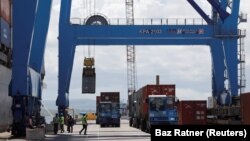The IMF predicted the global economy will grow by 2.8 percent this year and three percent in 2024, a decline of 0.1 percentage point from its previous forecasts in January.
"The global economy is recovering from the shocks of the last few years, and particularly of course the pandemic, but also the Russian invasion of Ukraine," IMF chief economist Pierre-Olivier Gourinchas said in a press briefing ahead of the release of the IMF's World Economic Outlook (WEO) report.
Close to 90 percent of advanced economies will experience slowing growth this year, while Asia's emerging markets are expected to see a substantial rise in economic output - with India and China predicted to account for half of all growth, IMF managing director Kristalina Georgieva said last week.
Low-income countries, meanwhile, are expected to suffer a double shock from higher borrowing costs due to high interest rates, and a decline in demand for their exports, Georgieva said. This could worsen poverty and hunger.
The leadership of the World Bank and IMF hope to use this year's spring meetings to promote an ambitious reform and fundraising agenda.
But their efforts will likely be overshadowed by concerns among member states over high inflation, rising geopolitical tension, and financial stability.
The IMF expects global inflation to slow to seven percent this year, down from 8.7 percent last year, according to the WEO forecasts.
While the picture is one of slowing growth, almost all advanced economies are still expected to avoid a recession this year and next.
Looking forward, the IMF forecasts that global growth will fall to three percent in 2028, its lowest medium-term forecast since the 1990s.
Slowing population growth and the end of the era of economic catch-up by several countries including China and South Korea are a large part of the expected slowdown, as are concerns about low productivity in many countries, according to Daniel Leigh, who heads the World Economic Studies division in the IMF's Research Department.
"A lot of the low hanging fruit was picked," he told reporters ahead of the publication of the World Economic Outlook.
"On top of that now, with the geopolitical tensions and fragmentation, this is going to also weigh on growth," he said.




